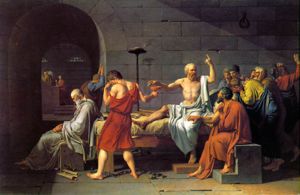Difference between revisions of "Philosopher"
From Conservapedia
(various grammatical changes) |
DavidB4-bot (Talk | contribs) (→See also: clean up & uniformity) |
||
| (8 intermediate revisions by 5 users not shown) | |||
| Line 1: | Line 1: | ||
| − | [[Image:David - The Death of Socrates.jpg|right|thumb|300px|''The Death of Socrates'' by [[Jacques | + | [[Image:David - The Death of Socrates.jpg|right|thumb|300px|''The [[Death of Socrates]]'' by [[Jacques Louis David]], 1787, depicts the philosopher [[Socrates]] as he is about to take poison hemlock as ordered by the court.]] |
| − | A '''philosopher''' | + | A '''philosopher''' is a person who contemplates the great mysteries of life and why things are the way they are. Many great philosophers were also [[scientists]]. |
| − | [[ | + | |
| + | |||
| + | == See also == | ||
| + | *[[Philosophy]] | ||
| + | *[[Greek influence on Western Culture]] | ||
| + | |||
| + | <br> | ||
| + | [[Image:Huber Un dîner de philosophes.jpg|left|320px]] | ||
| + | <br> | ||
| + | Jean Huber, Un dîner de philosophes, 1772 or 1773, Voltaire Foundation, Oxford. | ||
| + | |||
| + | |||
| + | |||
| + | [[Category:Philosophers]] | ||
| + | [[Category:Philosophy]] | ||
Latest revision as of 17:30, July 13, 2016

The Death of Socrates by Jacques Louis David, 1787, depicts the philosopher Socrates as he is about to take poison hemlock as ordered by the court.
A philosopher is a person who contemplates the great mysteries of life and why things are the way they are. Many great philosophers were also scientists.
See also
Jean Huber, Un dîner de philosophes, 1772 or 1773, Voltaire Foundation, Oxford.
